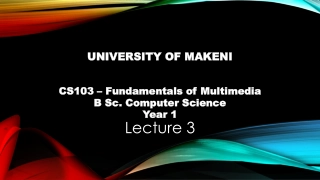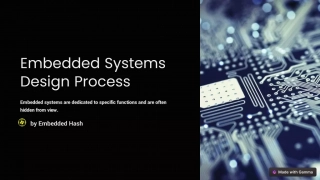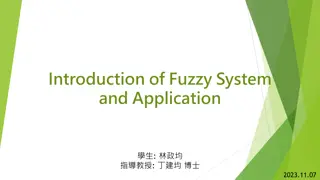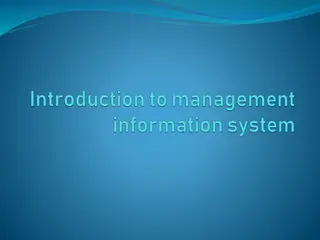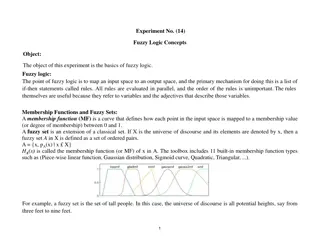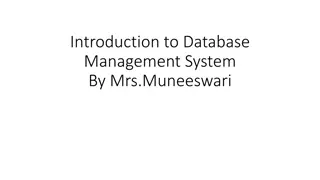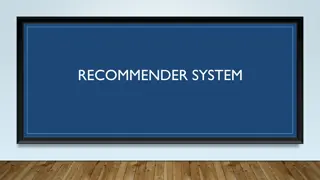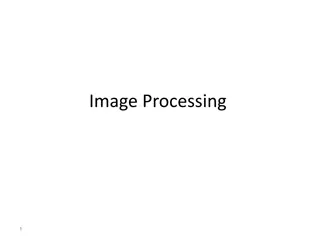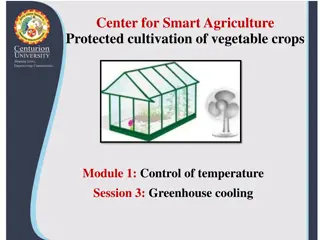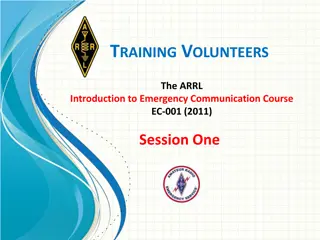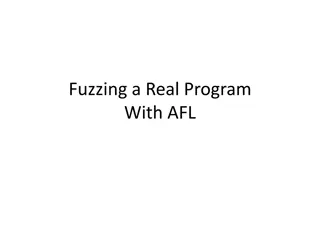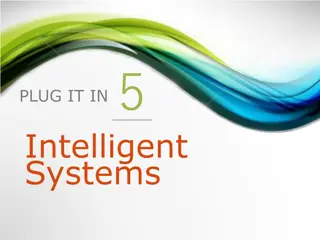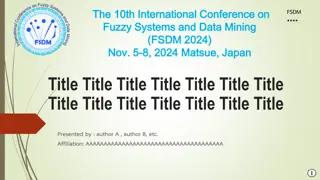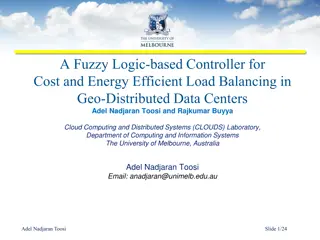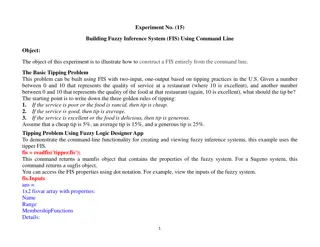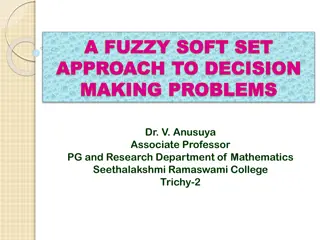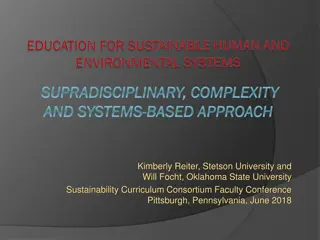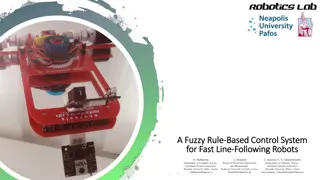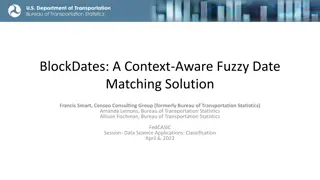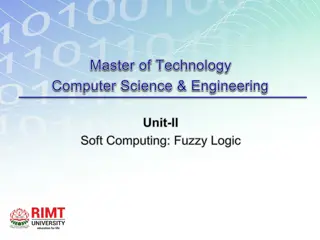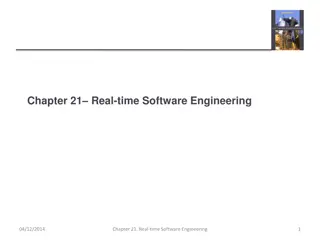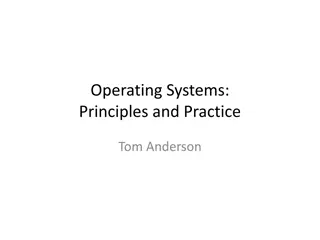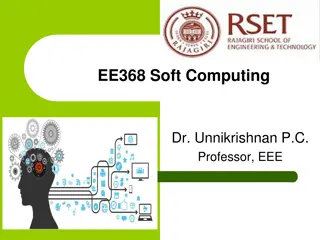Enhancing Food Systems for Improved Food Security and Job Creation
The importance of improving food systems to achieve sustainable development goals and enhance food security and job creation. It covers topics such as the current food systems, the impact of these systems, jobs in the food systems value chain, and key recommendations.
8 views • 24 slides
Understanding Multimedia Systems: Hardware and Software Components
Multimedia systems require specific hardware and software components to meet the demands of producing and playing multimedia content. Development systems are used for creating content with higher specifications, while playback systems are used for playing multimedia files with lower specifications.
8 views • 46 slides
Embedded Systems Design Process in the Embedded systems
Embedded systems are all around us, from the tiny microcontrollers in our household appliances to the sophisticated control systems in cars and aeroplanes. But how are these systems designed? Let's delve into the basics of the embedded systems design process in simple terms that anyone can understan
2 views • 9 slides
Overview of Distributed Systems: Characteristics, Classification, Computation, Communication, and Fault Models
Characterizing Distributed Systems: Multiple autonomous computers with CPUs, memory, storage, and I/O paths, interconnected geographically, shared state, global invariants. Classifying Distributed Systems: Based on synchrony, communication medium, fault models like crash and Byzantine failures. Comp
9 views • 126 slides
Introduction of Fuzzy System and Application
Fuzzy logic, introduced by Professor Zadeh in 1965, offers a way to model linguistic fuzzy information, providing better generalization and error tolerance for nonlinear systems. Fuzzy sets remove sharp boundaries in classical sets, allowing for gradual transitions between membership and non-members
7 views • 23 slides
Operating Systems
An operating system is a crucial program that manages all other programs on a computer. It handles tasks like input recognition, file management, and device control. There are different types of operating systems such as single-user, single-task systems, multi-user, multi-task systems, real-time ope
6 views • 11 slides
Understanding Information Systems in Organizational Management
Management in organizations is divided into three levels: operational, tactical, and strategic. Each level requires different information systems to support various activities. Operational systems focus on routine transactions and control processes, while middle-level systems aid in semi-structured
9 views • 39 slides
Understanding Negative Results in Systems Research
Systems research encompasses various areas such as operating systems, networking, and distributed systems. Negative results in systems research often go unpublished, leading researchers to focus on curating positive outcomes. This practice can hinder the credibility of scientific findings and impede
5 views • 23 slides
Explore the Top 5 Trends in Alarm Systems with Shellharbour Security Systems
Explore the latest trends in alarm systems with Shellharbour Security Systems. Learn about advancements such as smart home integration, wireless technology, AI-powered monitoring, and more. Stay informed to enhance your home or business security with cutting-edge solutions. Visit: \/\/shellharbourse
7 views • 8 slides
Understanding Management Information Systems (MIS)
Management Information Systems (MIS) are vital for collecting, processing, and analyzing data in business activities. They assist decision makers, facilitate communication, and maintain records. Components include people, data, business procedures, hardware, and software. Various types of informatio
2 views • 11 slides
Security Study of Chrome's Process-based Sandboxing
Investigate the effectiveness of process-based sandboxing in modern browsers like Chrome, focusing on the fuzzy boundaries between the web and local systems. The study explores vulnerabilities and potential attacks, proposing lightweight solutions to mitigate risks presented by imperfect existing se
1 views • 29 slides
Understanding Geographic Objects in GIS
Geographic objects play a crucial role in GIS by being easily distinguished and named based on parameters like location, shape, size, and orientation. These objects are studied collectively to understand their interactions and relationships, aiding in tasks such as navigation systems and route optim
4 views • 13 slides
Understanding Fuzzy Logic Basics
Fuzzy logic is a powerful concept that involves mapping inputs to outputs using rules, membership functions, and fuzzy sets. Logical operations like AND, OR, and NOT play a key role, along with if-then rules in formulating conditional statements. The fuzzy inference process includes fuzzification, a
0 views • 9 slides
Introduction to Database Management System Explained
This presentation covers the basics of database management systems, including definitions of data, types of data, structured and unstructured data, storing data in computers using file systems and database systems, and issues with file systems like data redundancy, inconsistency, difficult data acce
1 views • 18 slides
Understanding Different Types of Recommender Systems
Recommender systems play a crucial role in providing personalized recommendations to users. This article delves into various types of recommender systems including Collaborative Filtering, Content-Based, Knowledge-Based, and Group Recommender Systems. Collaborative Filtering involves making predicti
0 views • 7 slides
Understanding Computer Vision and Image Processing
Introduction to the fields of computer vision and image processing, exploring their differences and how they intertwine. Computer vision focuses on processing images for computer use, while image processing enhances images for human consumption. Topics include image analysis, restoration, enhancemen
1 views • 100 slides
Efficient Greenhouse Cooling Systems for Smart Agriculture
Active summer cooling systems like fan-and-pad and fog systems are crucial for maintaining optimal temperatures in greenhouses. These systems work by utilizing evaporation to remove heat from the air. Fan-and-pad cooling systems have been in use since 1954, where water is passed through pads to cool
1 views • 23 slides
Understanding Emergency Communication Systems for Volunteer Training
This content covers various topics related to emergency communication systems for volunteer training, including agency communication systems, government radio systems for police and fire departments, emergency medical radio systems, American Red Cross frequencies, and types of served-agency radio sy
2 views • 29 slides
Introduction to Embedded Systems Design
Embedded Systems Design, Chapter 1 provides an insightful overview of embedded systems, distinguishing them from general-purpose computers. The chapter delves into the characteristics of embedded systems, their design considerations, and the various types of embedded computers such as general-purpos
1 views • 7 slides
An Exploration of Semantics and Pragmatics: Classical vs. Prototype Approach
Delve into the world of semantics and pragmatics through an examination of the classical and prototype approaches to defining categories. From Aristotle's sharp boundaries to Rosch's fuzzy categories, uncover the complexities and limitations of language structure and meaning.
0 views • 22 slides
Practical Guide to Fuzzing Programs with AFL
Explore the process of fuzzing a real program using American Fuzzy Lop (AFL) with NASM, a popular Netwide Assembler. Learn how to obtain AFL and NASM, create test samples, minimize samples, start the fuzzer, and receive tips for successful fuzzing. Embrace the journey that may take days, weeks, or e
2 views • 8 slides
Exploring Intelligent Systems: AI, Expert Systems, and More
Delve into the realm of intelligent systems with topics ranging from artificial intelligence and expert systems to neural networks, fuzzy logic, genetic algorithms, and intelligent agents. Discover the value, limitations, and applications of these technologies through real-world examples and use cas
0 views • 35 slides
Information Systems in Organizations: Overview and Implementation
Information systems play a crucial role in organizations, encompassing transaction processing systems, functional area information systems, and enterprise resource planning systems. This content delves into the purpose of transaction processing systems, the support provided by information systems ac
0 views • 30 slides
International Conference on Fuzzy Systems and Data Mining 2024
The 10th International Conference on Fuzzy Systems and Data Mining (FSDM 2024) will be held in Matsue, Japan from Nov 5-8, 2024. The conference will feature presentations on various topics related to fuzzy systems, data mining, methodologies, results, and discussions. Participants will have the oppo
0 views • 8 slides
Fuzzy Logic Controller for Cost-Efficient Load Balancing in Data Centers
Large energy consumption in data centers leads to high operational costs and significant environmental impact. This study explores the challenges of using renewable energy sources for load balancing in geo-distributed data centers, proposing a fuzzy logic-based controller to optimize energy efficien
0 views • 24 slides
Building Fuzzy Inference System (FIS) Using Command Line: Tipping Problem Example
Illustrate constructing a FIS from the command line to solve the Basic Tipping Problem. Define rules based on service and food quality to determine tip percentage. Demonstrates creating and viewing fuzzy inference systems using a command-line approach.
0 views • 7 slides
Understanding Fuzzy Soft Set Approach to Decision Making Problems
Real-life problems often involve imprecise data, requiring mathematical principles like fuzzy set theory. Dr. V. Anusuya explores the application of fuzzy soft sets in decision making scenarios, discussing their role in handling uncertainties and approximations. The introduction covers various theor
0 views • 16 slides
Understanding Cascade Control Systems in Industrial Processes
Cascade control systems play a crucial role in improving process control efficiency by incorporating feedback loops within feedback loops. This type of control architecture helps to better handle disturbances and variations in the process by creating secondary loops that monitor specific parameters.
0 views • 8 slides
Sustainable Education for Human and Environmental Systems
Sustainable Education for Human and Environmental Systems (SHES) focuses on fostering sustainable societies through social learning and systems thinking. It aims to promote interconnectedness between human and environmental systems, with a vision of enhancing well-being while maintaining the viabili
0 views • 19 slides
Efficient and Effective Duplicate Detection in Hierarchical Data
This study explores the efficient and effective detection of duplicates in hierarchical data, focusing on fuzzy duplicates and hierarchical relationships in XML. It discusses the current and proposed systems, including the use of Bayesian networks for similarity computations. The methods involve vec
0 views • 25 slides
Understanding Embedded Systems and Cyber-Physical Systems
Embedded systems are specialized computer systems embedded within larger systems, such as control systems and car controllers. This lecture covers real-time aspects, applications of Cyber-Physical Systems (CPS), and examples like the Boeing 777/Airbus A380 cockpit. It discusses the design process of
0 views • 22 slides
Fuzzy Rule-Based Control System for Fast Line-Following Robots
This paper discusses the optimization of line-tracking and following control techniques in high-speed autonomous IoT devices such as line-following robotic vehicles. It introduces a proactive feed-forward control system utilizing computer vision and an array of analog infrared reflective phototransi
0 views • 14 slides
Context-Aware Fuzzy Date Matching: BlockDates Solution
BlockDates is a tool designed to improve the extraction and interpretation of date information embedded in text narratives, particularly handling date ranges and varied formats efficiently. The tool utilizes a context-aware approach to accurately interpret single dates and date ranges, aiding organi
0 views • 17 slides
Understanding Fuzzy Logic: Basics and Applications
Fuzzy logic deals with imprecise or ambiguous information, providing a way to represent and process data that is not clearly defined as true or false. This concept was introduced by Lofti A. Zadeh in 1965 through his research on Fuzzy Sets. Fuzzy logic allows for degrees of truth and provides a meth
0 views • 26 slides
Understanding Real-time Software Engineering for Embedded Systems
Embedded systems play a crucial role in controlling various machines and processes. Real-time software engineering focuses on designing systems that respond instantly to events, ensuring correctness and timeliness. Characteristics like continuous operation, unpredictable environment interactions, an
0 views • 59 slides
Understanding Operating Systems: Principles and Practice in CSE Curriculum
Dive into the world of operating systems through the lens of "Operating Systems: Principles and Practice" by Tom Anderson. Discover how this course fits in the UW CSE curriculum, covering systems programming, operating system interfaces, and distributed systems. Explore the project work on building
0 views • 21 slides
Applications of Fuzzy Logic in Soft Computing
Fuzzy logic is primarily used as the underlying logic system for decision support systems in various applications. From fuzzy controllers to fuzzy rule bases, this technology enables approximate reasoning similar to human decision-making processes. Explore the architecture and major components of Fu
0 views • 27 slides
Enhancing Arabic Sentiment Analysis Using Fuzzy Logic Approach
Presenter Mariam Biltawi from Princess Sumaya University for Technology in Jordan discusses a research project on enhancing automatic polarity classification of Arabic text using a lexicon-based approach with fuzzy logic. The project utilizes a large-scale Arabic book reviews dataset and a sentiment
1 views • 30 slides
Prototyping AI Component for Fuzzy Matching in Controlled Vocabulary Terms
This roadmap outlines the development of an AI component that utilizes fuzzy matching to help users find controlled vocabulary terms. The process involves user input, AI searching, and user validation, aiming to streamline term selection and minimize manual steps. The system integrates thematic dict
0 views • 17 slides
Evaluating Musical Instruments with Fuzzy QFD MCDM
This research explores the optimization of musical instrument manufacturing using Multi-Criteria Decision Making models and Quality Function Deployment in a scholarly study by Peter Poon Chong and Terrence R.M. Lalla. The study delves into organological categories, acoustic perceptions, and engineer
0 views • 19 slides

